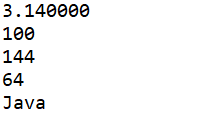Java格式化輸出的四種方法
阿新 • • 發佈:2021-01-20
一、System.out.printf()
Java SE5推出了C語言printf()風格的格式化輸出功能。
String str="Java";
double pi=3.14;
int i=100;
//"%"表示進行格式化輸出,其後是格式的定義
System.out.printf("%f\n",pi);//"f"表示格式化輸出浮點數
System.out.printf("%d\n",i);//"d"表示格式化輸出十進位制整數
System. 
二、System.out.format()
Java SE5引入的format()方法模仿C的printf()方法,可用於PrintStream或者PrintWriter物件,包括System.out物件。用法基本上和System.out.printf()類似。
String str="Java";
double pi=3.14;
int i=100;
//"%"表示進行格式化輸出,其後是格式的定義
System.out.format("%f\n",pi);//"f"表示格式化輸出浮點數
System.out.format("%d\n",i);//"d"表示格式化輸出十進位制整數
System.out.format("%o\n",i);//"o"表示格式化輸出八進位制整數
System.out.format("%x\n" 
三、Fomatter類
Java中所有的格式化功能都由java.util.Formatter類處理。當你建立一個Formatter物件時 ,需要向其構造器傳遞一些資訊,告訴它最終的結果將向哪裡輸出。
import java.util.Formatter;//使用Formatter類時需要匯入java.util.Formatter
Formatter f=new Formatter(System.out);//建立一個Formatter物件,指定輸出為System.out
String str="Java";
double pi=3.14;
int i=100;
//"%"表示進行格式化輸出,其後是格式的定義
f.format("%f\n",pi);//"f"表示格式化輸出浮點數
f.format("%d\n",i);//"d"表示格式化輸出十進位制整數
f.format("%o\n",i);//"o"表示格式化輸出八進位制整數
f.format("%x\n",i);//"x"表示格式化輸出十六進位制整數
f.format("%s\n",str);//"s"表示格式化輸出字串
f.format("一個字串:%s,一個浮點數:%f,一個整數:%d",str,pi,i);//可以一次輸出多個變數,注意順序即可

四、String.format()
String.format()是一個static方法,接收與Formatter.format()一樣的引數,其返回值:String物件,適用於一次輸出。
String str="Java";
double pi=3.14;
int i=100;
//"%"表示進行格式化輸出,其後是格式的定義
System.out.println(String.format("%f",pi));//"f"表示格式化輸出浮點數
System.out.println(String.format("%d",i));//"d"表示格式化輸出十進位制整數
System.out.println(String.format("%o",i));//"o"表示格式化輸出八進位制整數
System.out.println(String.format("%x",i));//"x"表示格式化輸出十六進位制整數
System.out.println(String.format("%s",str));//"s"表示格式化輸出字串

